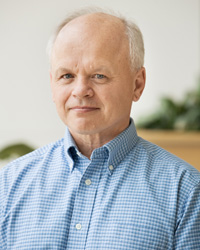Next generation biofuels from algae
Dr. Richard Sayre
Senior Research Scientist
Los Alamos National Laboratory and New Mexico Consortium
3:30pm - January 30, 2014
(ETLC) 1-001
Host: Dr. William McCaffery
Abstract:
One of the more environmentally sustainable ways to produce energy is the conversion of solar energy into biomass. Plants and algae use solar energy to reduce carbon dioxide to carbohydrates and oils. The first-generation biofuels (alcohol and diesel) were/are produced from only a few crop systems. Typically, only a fraction of the solar energy that is captured and converted into chemical energy (biomass) is harvestable. Inefficiencies in feedstock harvesting and processing further reduce the recoverable energy and net carbon capture. Next generation biofuel production systems are expected to have a lower impact on the environment, greater productivity, greater energy return on investment, reduced carbon emission indices, and will be directly compatible with the existing energy infra-structure.
One of the more attractive next generation biofuel systems is algae. Algae grow rapidly, have high oil content (up to 55% oil), and are capable of producing 2-10 times more biomass per unit land area than any terrestrial crop system. In addition, algae can potentially capture CO2 as bicarbonate from CO2 emission point sources as well as utilize nutrient-rich waste water. Significantly, single-celled algae are also one of the more evolutionary diverse groups of organisms whose biodiversity represents a rich resource to bioprospect for novel genes. However, the economics of algal bioenergy production are currently not favorable. We will identify some of the constraints facing algal biofuels production systems and discuss strategies and progress towards overcoming those constraints with particular emphasis on engineering algae to enhance biomass and bioproduct production while reducing production costs.
Biography:
 Dr. Richard Sayre is currently a senior research scientist at Los Alamos National Laboratory (LANL) and the New Mexico Consortium (NMC). Dr. Sayre's research interests include; characterization of primary processes in photosynthesis, biofuel, algal and plant biotechnology, and crop nutritional biofortification. Dr. Sayre completed his undergraduate degree in biology at Humboldt State University, his Ph. D. at the University of Iowa, and did postdoctoral work at Harvard University. From 1986-2008, Dr. Sayre was a faculty member and later Chairman of the Department of Plant Cellular and Molecular Biology at Ohio State University. Prior to coming to LANL/NMC, Dr. Sayre was the Director (2008-2011) of the Enterprise Rent-A-Car Institute for Renewable Fuels at the Donald Danforth Plant Science Center in St Louis.
Dr. Richard Sayre is currently a senior research scientist at Los Alamos National Laboratory (LANL) and the New Mexico Consortium (NMC). Dr. Sayre's research interests include; characterization of primary processes in photosynthesis, biofuel, algal and plant biotechnology, and crop nutritional biofortification. Dr. Sayre completed his undergraduate degree in biology at Humboldt State University, his Ph. D. at the University of Iowa, and did postdoctoral work at Harvard University. From 1986-2008, Dr. Sayre was a faculty member and later Chairman of the Department of Plant Cellular and Molecular Biology at Ohio State University. Prior to coming to LANL/NMC, Dr. Sayre was the Director (2008-2011) of the Enterprise Rent-A-Car Institute for Renewable Fuels at the Donald Danforth Plant Science Center in St Louis.
Dr. Sayre is currently the Scientific Director (2009-2014) of the Center for Advanced Biofuel Systems, a DOE-Energy Frontier Research Center, and the National Alliance for Advanced Biofuels (2010-2013), the DOE algal biomass program. From 2005-2010, Dr. Sayre directed the BioCassava Plus Program funded by the Grand Challenges in Global Health Program of the Bill and Melinda Gates Foundation. The BioCassava Plus program focused on engineering cassava to provide complete nutrition for subsistence farmers in sub-Saharan Africa who grow cassava as a staple crop. Dr. Sayre is also a co-founder and CTO of Phycal Inc, a biofuels company. Dr. Sayre has received several honors including: College of Biological Sciences Distinguished Professor, Ohio State University (2005-2008); honorary member of Phi Beta Kappa (2006); Fulbright Scholar; Inst. Quimica, University Sao Paulo, Sao Paulo, Brazil. (2007); Selected by Nature as one of "Five Crop Researchers Who Could Change the World". Nature 456: 563-569 (2008); invited attendee at Google/Nature/O'Reilly SciFoo Camp for Innovators (2009); and was elected a Fellow of the American Association for the Advancement of Sciences (2011). Dr. Sayre is an associate editor for Frontiers in Plant Sciences and is co-editor-in-chief of Algal Research.